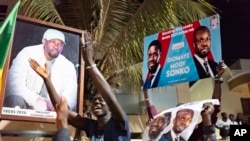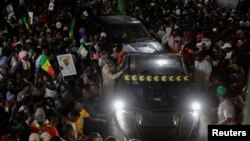The release of Sonko and Faye had been expected after Senegalese lawmakers passed an amnesty law on March 6. This was an attempt by authorities to ease tensions following their thwarted bid to postpone the vote initially scheduled for February 25.
The state broadcaster did not give further details, and it was not immediately clear where the opposition leaders were after their release.
Thousands of supporters massed in Dakar, the capital, to celebrate the news, chanting Sonko's name on the gridlocked street where he lives. Some lit flares, while others danced or tooted motorbike and car horns.
"We've been waiting for this day for so long. Prayed for it," said health worker Fatima, 52, who gave only her first name.
Fatima had rushed to join the crowd when she heard that the opposition leaders were free.
"I believe Sonko can change the country," she said.
Fatima’s sentiments were echoed by Ibrahima Kane, a Senegalese political analyst who says the release of the opposition leaders’ marks “a new page of our (Senegal’s) political history, especially during the election period.”
“I’m sure that the release of the candidate of the party and the leader of the party will really galvanize their followers, but also change the tone of the campaigns,” he added.
Sonko has called on his supporters to back Faye in the presidential race, a concern for other candidates as the opposition leader enjoys widespread support, particularly among young people who are frustrated with economic hardships and a lack of jobs in the West African country of 17 million.
Sonko’s dissolved Pastef party formed a coalition and picked Faye as a candidate in November.
This was in reaction to Sonko’s disqualification over a defamation conviction he said was politically motivated — allegations denied by authorities.
Faye, who previously was relatively unknown but also in detention, remains eligible because a ruling in a case against him is yet to be passed. He is linked to charges including defamation and contempt of court.
There are no public election opinion polls in Senegal, but Faye is seen as a strong contender among the 19 candidates vying to succeed President Macky Sall, who is stepping down on April 2, after two terms.
Earlier on Thursday, the head of Amnesty International Senegal, Seydi Gassama, said authorities had sought to limit Faye's electoral chances by keeping him in prison, seeing him as the main threat to the ruling coalition's candidate, Amadou Ba.
"It's really regrettable that we're at this point because ... it shows that we're not ready to organize a free and democratic election," Gassama said, prior to the release of Sonko and Faye.
Some information for this article was sourced from Reuters. VOA’s James Butty contributed to this article.


Forum